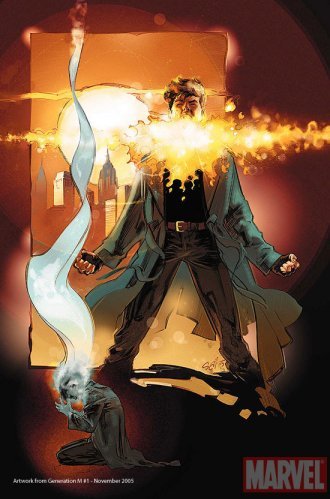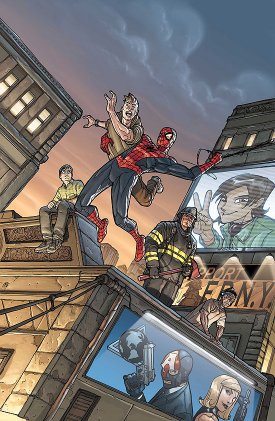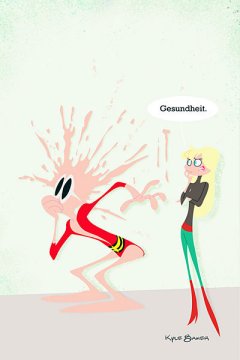|
The
Fanboy Planet Preview Spotlight 11/30/05
brought to you by Brian's Books of Santa
Clara
Each
week we look through the upcoming releases to offer our two
cents as to what's hot and what's not. You can agree with
us or not, but spend your money wisely. Generation
M #1
writer: Paul Jenkins
artists: Ramon Bachs
and John Lucas
Any comics fan
by now knows that Marvel seriously cut down on their mutant
population. Sure, you think, you've heard that one before,
plagued by memories of sprawling incoherent events such
as X-Tinction Agenda. Press releases promise a lot,
colorful noise abounds, and in the end, you get a new status
quo that looks a lot like the old status quo.
Welcome to the
House of M.
Everything Marvel
promised has turned out to be far more than just hype, and
ladies and gentlemen, Generation M alone proves it.
Only 198 mutants
remain with active mutant powers. That seems like a lot
to the casual reader, but in the Marvel Universe that leaves
at least hundreds of thousands more suddenly without abilities
they had come to rely upon. Mutopia touched briefly
on the moments after the Scarlet Witch cried "No more mutants!"
Generation M explores the days and weeks afterward.
Specifically,
the series looks to focus on some fairly high profile character
that now find themselves ordinary. Actually, in the case
of Jonathan Starsmore aka Chamber, he is now extraordinary
in a very different way.
First appearing
in Generation X #1, when Jonathan's power first manifested
itself, he blew away his own lower jaw. Possessed of a strange
energy equivalent to being a nuclear reactor wrapped in
pseudo-human skin, Chamber spoke telepathically and had
learned to focus his energy into destructive blasts that
wouldn't destroy his human shell - or at least, not damage
it much further, because somewhere along the way he lost
his chest, too.
Take away those
powers, and Starsmore is one horribly disfigured young man.
Writer Paul Jenkins lights onto the idea that the mutant
now has the same fate as the Tin Woodsman, but no wizard
can give him a heart.
Instead, a grim
Cyclops and Wolverine contact a local hospital and find
a way to hopefully make Chamber's last days more comfortable.
It seems almost impossible that there would be a way to
bring him back. Nor does it seem like Generation M
has miracles on its mind; at best, this celebrates the quiet
perseverance of people just trying to survive.
Framed by a
character writing a weekly newspaper column, the mini-series
already does a great job of capturing the hysteria, the
fear and the consequences. It's almost a shame that Jenkins
has to throw in a darker connecting plot, because just the
individual explorations of ex-mutants' lives resonates with
some of the strongest storytelling Marvel has done this
year - and that's saying a lot.
Ramon Bachs
and John Lucas do a solid job with the artwork, but I have
to be honest and admit they look a lot like many other mid-level
teams working in comics right now. Though the layouts are
readable and quite well-drawn, they don't have much distinctive
about them. Bachs looks like Ivan Reis looking like Sal
Velluto. And most of you are probably asking, who? Exactly.
Next issue,
Generation M focuses on Jubilee. If you want proof
of how serious Marvel is about this event, think on that.
Just a few months ago, she had her own mini-series. Now
she's a statistic.
Runners-Up:
Amazing Fantasy
#15: It's possibly your best buy this week because of
the sheer variety of stories. But they're also a variety
of quality. A couple read just like the recent Gravity
mini-series, riffing on the stereotypes of "the Marvel Hero."
Heartbreak Kid is interesting, but clearly a one-shot, placing
a J.M. DeMatteis Defenders character at a more crucial
juncture in Marvel history. The most potential for being
something different comes from Monstro, a mysterious super-powered
guy who wants nothing to do with capes and cowls but still
does good. For sheer fun, one of my top five writers Dan
Slott offers up the whimsical recurring throwaway "Blackjack."
Just remember, Dan - satire is what closes on Saturday night.
Except in comics, where we don't necessarily understand
it but keep on buying it anyway.
Neil Gaiman's
Neverwhere #5: Glenn Fabry does some of the best cover
work in the business. Even just being adapted, Neil Gaiman
throws out tons of great ideas in 21 pages. The plot thickens,
the worm turns, and Vertigo continues being the king of
dark fantasy in comics. What an odd phrase that is - dark
fantasy. Heck, it's just good storytelling.
Plastic Man
#19: Once again, a cover image speaks a thousand words,
and Kyle Baker wreaks havoc throughout the DC Universe.
It's hilarious, surprising, and quite possibly after Infinite
Crisis gets through, Plastic Man will find a
firm place in continuity. I don't know if that would horrify
Baker or not, but in the meantime, I'm having fun.
The Sentry
#3: Though Paul Jenkins hasn't quite recaptured the
majesty of the first Sentry run, and some of the events
here seem to contradict the logic established in that previous
mini-series, it's still an interestingly skewed look at
the Marvel Universe. How could all of these villains be
so effectively wiped from people's memories? What exactly
is it about the Sentry that makes the Hulk into a genial
giant sidekick? And really, how can this guy retain his
powers without completely destroying the world? Enquiring
minds want to know, and thus should buy this book.
X-Men/Power
Pack #2: Wow. Marvel should be making a fortune with
Beast plush toys. Perhaps more importantly, they should
be creating a new generation of readers with this issue,
which is a great kids' comic without violating the characterization
of any X-characters.
Hey, write to us and
let us know what you think. Talk about it on the
forums!
|








